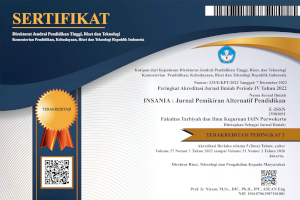Desain Pengembangan Kurikulum Model Ralph Tyler pada Pembelajaran Al-Qur’an Hadits di Tingkat Madrasah Ibtidaiyah
DOI:
https://doi.org/10.24090/insania.v26i2.5058Kata Kunci:
kurikulum, Ralph Tyler, Al-Qur'an Hadits, madrasah ibtidaiyahAbstrak
Perbaikan pada ranah pendidikan dan kurikulum harus dilakukan seiring dengan perkembangan ilmu pengetahuan. Hal ini dilakukan dalam upaya menciptakan sistem pendidikan yang tepat dan benar. Seringnya perubahan dalam kurikulum pendidikan menghadirkan masalah tersendiri. Kurikulum pendidikan di Indonesia sudah mengalami dua belas kali pergantian, akan tetapi masih mengalami permasalahan yang cenderung sama dengan yang dihadapi oleh kurikulum-kurikulum sebelumnya. Tujuan penelitian ini adalah menawarkan model pengembangan kurikulum Ralph Tyler dan implikasinya pada pembelajaran Al-Qur’an Hadits pada tingkat Madrasah Ibtidaiyah. Metode penelitian yang digunakan dalam ini menggunakan metode kualitatif. Peneliti mencari rujukan di berbagai media massa guna memperjelas informasi dalam penelitian ini. Jenis penelitian ini merupakan studi literatur sehingga sangat mementingkan informasi dan kejelasan dari media massa dalam pengembangan dan pengidentifikasian kasus tersebut. Model pengembangan kurikulum Tyler memiliki beberapa kekurangan dan kelebihan. Sekolah dasar menjadi salah satu tingkat satuan pendidikan yang dapat menggambarkan serta mengidentifikasi bagaimana kurikulum Tyler dapat berkembang, khususnya pada pembelajaran Al-Qur’an dan Hadis. Kurikulum Tyler menggambarkan bagaimana seorang peserta didik mendapatkan pengalaman selama kegiatan belajar berlangsung. Pembelajaran Al-Qur’an Hadits harus mampu memiliki tujuan yang jelas serta memberikan pengalaman pembelajaran yang berguna bagi peserta didik. Hasil penelitian ini menunjukan terdapat empat bentuk desain kurikulum pembelajaran Al-Qur’an Hadits. Pertama, harus menentukan tujuan atau output pendidikan yang diharapkan. Kedua, menentukan pengalaman belajar. Ketiga, mengorganisasi pengalaman belajar. Keempat, mengevaluasi efektivitas pengalaman belajar.Unduhan
Referensi
Dako, R. T. (2012). Kenakalan Remaja. Jurnal Inovasi, 09(02), 1–7.
Darwis, A. (2006). Pengubahan Perilaku Menyimpang Murid Sekolah Dasar. Depdiknas RI.
Fitriyani. (2018, August 15). Ingin Anak Jadi Hafidz? Ini 7 Tips Mengajarkan Anak Hafal Al-Qur’an. TheAsianparent. https://id.theasianparent.com/cara-menghafal-alquran
Habibullah, N. (2021). Teori Ralph W. Tyler dalam Pengembangan Kurikulum Pondok Pesantren Darussalam Gontor 10 Jambi. At-Ta’lim Jurnal Kajian Pendidikan Agama Islam, 3(2), 50–62.
Hidayat, T., Firdaus, E., & Somad, M. A. (2019). Model Pengembangan Kurikulum Tyler dan Implikasinya dalam Pembelajaran Pendidikan Agama Islam di Sekolah. Potensia: Jurnal Kependidikan Islam, 5(2), 197–218. http://dx.doi.org/10.24014/potensia.v5i2.6698
Idi, A. (2011). Pengembangan Kurikulum: Teori dan Praktik. Ar-Ruzz Media.
Khozin. (2019). Desain Kurikulum Pendidikan Agama Islam Berperspektif Multikulturalisme untuk Mengeliminasi Potensi Kekerasan. Proceeding Annual Conference on Islamic Education (ACIED) 2019, 1, 36–44. http://acied.pp-paiindonesia.org/index.php/acied/article/view/5
McDermott, J. (2012). Looking Back to Move Forward: A View of Nursing Education through the Theoretical Lens of Dewey, James and Tyler. Nurse Education Today, 32(8), 39–41. https://doi.org/10.1016/j.nedt.2012.06.020
Putra, A. T. A. (2018). Evaluasi Program Pendidikan: Pendekatan Evaluasi Program Berorientasi Tujuan (Goal-Oriented Evaluation Approach: Ralph W. Tyler). Shautut Tarbiyah, 18(1), 55–68. http://dx.doi.org/10.31332/str.v18i1.65
Rahardjo, M. (2011). Metode Pengumpulan Data Penelitian Kualitatif. UIN Maliki Malang.
Rahmita, D. (2020, July 7). Bagaimana Karakteristik dan Kondisi Psikologis Anak SD [Forum Post]. https://www.sehatq.com/forum/karakteristik-dan-kondisi-psikologis-anak-usia-2-tahun-q18016
Ramdhan, T. W. (2019). Desain Kurikulum Pendidikan Islam Berbasis Tauhid. Insyiroh: Jurnal Studi KeIslaman, 5(1), 118–134. https://doi.org/10.35309/alinsyiroh.v5i1.3400
Ritonga, M. (2018). Politik dan Dinamika Kebijakan Perubahan Kurikulum Pendidikan di Indonesia. Bina Gogik: Jurnal Ilmiah Pendidikan Guru Sekolah Dasar, 5(2), 88–102.
Setiawan, E. (2019). Studi Pemikiran Fatima Mernissi tentang Kesetaraan Gender. Yinyang Jurnal Studi Islam Gender Dan Anak, 14(2), 221–244. https://doi.org/10.24090/yinyang.v14i2.3224
Shobuni, S. M. A. A. (2001). Ikhtisar Ulumul Qur’an Praktis (M. Q. Nur, Trans.). Pustaka Amani.
Siswadi. (2020). Model Manajemen Kurikulum dada Program Fullday School di Madrasah Ibtidaiyah. INSANIA : Jurnal Pemikiran Alternatif Kependidikan, 25(1), 79–91. https://doi.org/10.24090/insania.v25i1.3575
Sudarsono. (2005). Latar Belakang Kenakalan Remaja. Rineka Cipta.
Sujana, I. W. C. (2019). Fungsi dan Tujuan Pendidikan Indonesia. Adi Widya: Jurnal Pendidikan Dasar, 4(1), 29–39. https://doi.org/10.25078/aw.v4i1.927
Wiranda, D. (2021, March 3). Kualitas Pendidikan Indonesia Disebut Tertinggal 128 Tahun dari Negara Maju. Larispa Research and Consulting. http://larispa.or.id/berita/kualitas-pendidikan-indonesia-disebut-tertinggal-128-tahun-negara-maju/
Unduhan
Diterbitkan
Cara Mengutip
Terbitan
Bagian
Lisensi
Authors who publish with this journal agree to the following terms:
Authors retain copyright and grant the journal right of first publication with the work simultaneously licensed under a Creative CommonsAttribution-ShareAlike License that allows others to share the work with an acknowledgment of the work's authorship and initial publication in this journal.
Authors are able to enter into separate, additional contractual arrangements for the non-exclusive distribution of the journal's published version of the work (e.g., post it to an institutional repository or publish it in a book), with an acknowledgment of its initial publication in this journal.
Authors are permitted and encouraged to post their work online (e.g., in institutional repositories or on their website) prior to and during the submission process, as it can lead to productive exchanges, as well as earlier and greater citation of published work (See The Effect of Open Access).









